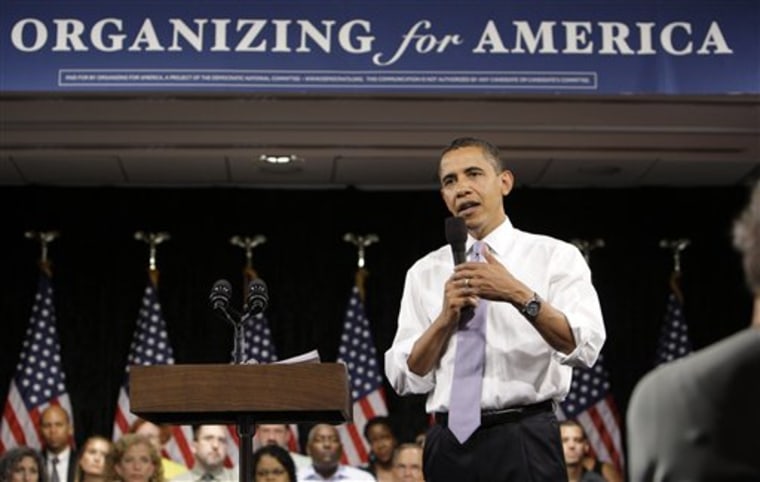The 44th president was sworn in and barely took a breath. Within days — hours, really — he set to tackling a bruising recession that he inherited. And an enormous policy agenda that he didn't.
Ever the multitasker, armed with his trademark charisma and eloquence, Barack Obama was everywhere, pitching his plans. Automotive and financial bailouts. A $787 billion plan to stimulate the economy. An energy policy to regulate industry emissions. Health care overhaul. Private sector. Public sector.
He wasn't just the man of the hour. On TV he seemed to be the man of every hour. And he wasn't just the country's new chief executive. He was becoming something else as well: chief spokesman for government itself — and at a precarious time in the relationship between Americans and the federal system that oversees them.
As the line between the public and private sectors blurs ever more, people are losing confidence in each. They are wary of more federal involvement in their lives. They are angry about mounting national debt and exploding federal deficits.
"The government is everywhere, and nothing's getting better," says 28-year-old Andrew Measel of Pittsburgh. "That's why people don't have any faith — they shouldn't."
Beyond the debate over the size of government is this less defined question whose answer could influence the outcome of Obama's presidency: As he sells his administration's solutions to the country's problems, is his do-everything, be-everywhere leadership style in tune with the times?
This is a guy who wears his Blackberry everywhere and who relishes hearty back-and-forth over the different solutions to a problem. He moved into the White House when urgent problems in war and recession required strong action.
He wants to get as much done as possible, and he expresses confidence that people will grasp what he's trying to do if he uses simple language to explain complex problems.
Obama has been a constant presence in the mass media as he expands the bureaucracy's reach into the private sector while presiding over national debates on issues that have become the focus of arguments over big government.
In doing so, he has created a quandary. Put aside for a moment the question of whether government is actually intruding into people's lives more than before. The point is that many people feel like it is — in part because Obama doesn't stop talking about his goals. If President George W. Bush got slapped around for being inarticulate, is Obama obnoxiously articulate?
"Obama's omnipresence refracts as big government to some degree," says Eric Dezenhall, an image consultant who has worked with celebrities and business leaders. "For those who like him, it reinforces their support for him. But for others, every time he appears, he conjures up the whole whiff of overreaching government and causes resentment."
The president's approach was on full display when he forced out General Motors' chief executive, Rick Wagoner, and then went before the public to explain his administration's intervention in the auto industry.
He dives into the details of energy policy and the economy at news conferences and interviews. He recently hit five Sunday news programs — and David Letterman's show the next night — to explain his health care overhaul, a plan that has led to fierce discussions over Washington's proper role
Some have interpreted other actions as government intrusion, particularly when Obama interceded in a local law enforcement dispute between a white police officer and a black college professor.
"He had no business stepping into that. It's not the president's place to get involved in something like that," says Patty Porter, 55, of Wheeling, W.Va.
This wariness wasn't born with Obama. This country was, after all, settled by people motivated by the notion of being far away from England. And there was that nasty business in the 1770s with taxes, King George III and the war for independence.
"We can do just fine if we can just get the government off our backs and cut individuals and entrepreneurs loose," says Peter Marx, who owns a used book store in Steubenville, Ohio. He adds: "Get out of my way, Washington, just get out of my way."
A Gallup Poll last month showed that 57 percent of people surveyed think government is trying to do too many things that should be left to individuals and businesses. That's 10 percentage points more than in March and the highest mark on that question over the past 10 years.
Earlier this year, more than half the people questioned by Gallup chose big government over big labor or big business as the largest threat to the country in the long term, while an overwhelming majority said in a recent Associated Press-GfK survey they are worried that increasing federal debt will harm the financial future of the next two generations.
While Obama has been criticized for being too visible, AP-GfK surveys in the spring and summer found that most people say he is on TV about the right amount.
Still, he runs the risk of making people tune out. President Franklin D. Roosevelt scaled back the frequency of his fireside chats for exactly that reason.
"People would get bored with him and they would turn to other actors in that period," says Fred Greenstein, a Princeton University emeritus professor who wrote "The Presidential Difference: Leadership Style from FDR to Barack Obama."
In this way, Obama may give an opening to Republicans looking for a way back to power.
Ahead of congressional elections next year, Obama's daily appearances can rev up a dispirited GOP base. Given the public's negative attitudes about Washington, Republicans think they have a winning message by castigating Obama as a big-government, big-spending liberal, even though federal deficits and national debt soared under Bush and when the GOP controlled Congress.
So is Obama's style the right one for the time? "We can't anticipate the history books," Greenstein says. "If he gets results, it's going to look like a very strong performance. If he doesn't, then it's going to look badly."
